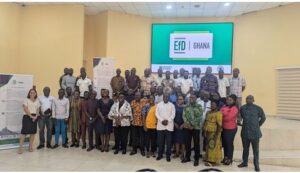By Joshua Worlasi AMLANU & Ebenezer Chike Adjei NJOKU
A recent study by the Environment and Natural Resource Research Initiative (ENRRI-EfD Ghana) has revealed that 91 percent of fishers in the country support removing the long-standing premix fuel subsidy, a policy originally intended to make fuel more affordable for artisanal fishers.
Of the nine percent who voted against removal of the subsidy policy, more than one-half (52 percent) agreed that the proposed policy’s reason for removing the subsidy is good.
The fishermen and fish traders are willing to pay approximately GH¢83 and GH¢87 per gallon for the premix fuel, respectively.
However, many of these fishers now argue that the subsidy is ineffective and they are concerned about irregular distribution of the fuel provided.
According to preliminary findings from the study, fishers only receive subsidised fuel for about four months each year – leading to significant challenges in planning and sustaining their livelihoods.
The irregular supply of subsidised fuel has led to suspicions of mismanagement, with some fishers reporting that the fuel they do receive is often damaged or of poor quality – which negatively impacts their equipment.
This, combined with over capacitation in the sector – currently more than 12,000 canoes in operation, far exceeding the sustainable range of 8,000 to 9,000 – has left many feeling that the subsidy does more harm than good.

Professor Wisdom Akpalu, Director of ENRRI/EfD-Ghana, argued that the premix fuel subsidy is exacerbating the overfishing crisis.
While the subsidy was intended to reduce operational costs, it has instead encouraged more canoes to enter the sector; leading to overfishing and environmental degradation.
The academic stressed that the subsidy is no longer serving its intended purpose: “The system is encouraging overfishing rather than boosting productivity, contributing to the decline of our marine resources,” he noted, during a conference dubbed ‘Is Premix Fuel Subsidy in Ghana’s Artisanal Fishery Desirable? Preliminary Results’ at the Institute of Statistical, Social and Economic Research (ISSER).
The study suggests removing the subsidy would not only reduce overcapacity but also promote more sustainable fishing practices.
The report advocates phasing out the premix fuel subsidy and redirecting the US$40million saved toward programmes that would directly benefit fishing communities.
These could include capacity-building initiatives, support for alternative livelihoods and promoting sustainable fishing techniques to ensure the sector’s long-term viability.
While removing the subsidy may create short-term difficulties for fishers as they adjust to market-priced fuel, the study argues that the long-term benefits – including recovery of fish stocks and the reduction of overcapacity – would outweigh the challenges.
Interestingly, the research suggests that removing the subsidy could garner political support as many fishers themselves are advocating for the reform.
Prof. Akpalu highlighted the need for targetted interventions that build resilience in coastal communities.
“Rather than distorting the market with subsidies, we need to focus on proper development programmes that ensure the future of Ghana’s fisheries,” he said.
Despite potential benefits, the study suggests that any policy-shift must be carefully planned and implemented to avoid disruptions in the livelihoods of fishers. It emphasises the importance of monitoring impacts of such changes and ensuring that funds saved from the subsidy are effectively utilised to improve local communities.
While acknowledging that the demand for subsidy removal may stem from frustration with the current system, Director-ISSER Prof. Peter Quartey argued that the underlying message is a call for greater efficiency, regularity and transparency in the sector.
“Fishermen are seeking streamlined processes, reduced influence of middlemen and politicians, and a guarantee of more reliable and equitable distribution of subsidies,” he said on the event’s sidelines.
The study’s full findings are set to be published in the coming months, with recommendations for government officials and policymakers.










